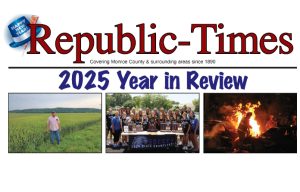Income tax amendment questions
Election Day is 20 days away, and early voting is off to a strong start, but a few common questions remain about Illinois’s proposed constitutional amendment.
The amendment would change the state’s income tax system from a flat one, where everyone is taxed at the same rate, to a graduated one, where tax rates vary based on income. Illinois is one of just nine states with a flat income tax.
The Republic-Times examined three common questions regarding the proposal.
How would the graduated income tax affect small businesses?
This question does not have a clear-cut answer.
If the amendment passes, those who file a tax return as single pay 4.75 percent on taxable income up to the first $10,000; 4.9 percent on income between $10,001 and $100,000; 4.95 percent on income between $100,001 and $250,000; 7.75 percent on income between $250,001 and $350,000; 7.85 percent on income between $350,001 and $750,000; and 7.99 percent on all income if a single filer makes over $750,000, at least at first.
For joint filers, the same rates apply but they cover different ranges. The 7.75 percent rate is on income between $250,001 and $500,000; the 7.85 percent rate applies to income between $500,000 and $1 million; and joint filers making over $1 million pay 7.99 percent on all income.
The corporate tax rate would also increase from 7 percent to 7.99 percent, but most businesses in Illinois – particularly small ones – do not pay the corporate tax.
They instead operate as pass-through entities, which means profits flow straight to owners and are taxed as individual income.
Groups advocating against the proposal have numerous ads arguing over 100,000 small businesses would see a devastating increase in their taxes if the amendment is ratified by 60 percent of those voting on the amendment or a majority of those voting in the election.
Public data is insufficient to fully verify or debunk that claim, though there are some indicators.
According to an analysis by the Chicago Sun-Times, PolitiFact and the Better Government Association, data is not specific enough to show how many small businesses would be affected by the tax change, but it appears only a small portion of the over 1 million small businesses in Illinois would be affected.
That trio of fact checkers rated the claim as a half-truth, writing “only a wealthy subset of small businesses, which generally pass their profits to shareholders, would be affected — and data suggests that portion would be small.”
A key source for that determination was a blog post by the nonpartisan, left-leaning Center for Tax and Budget Accountability, which supports the amendment, arguing small businesses would not suffer from the income tax change.
Using Illinois Department of Revenue data from 2017, the CTBA found that of about 6.2 million individual taxpayers, only 189,133 had taxable incomes over the $250,000 threshold for tax hikes under the proposed rates.
If all those taxpayers were business owners, which is highly unlikely, that would/ amount to just 15 percent of all small businesses paying more in taxes. The remaining 85 percent of small business owners would still pay the same or less, the CTBA wrote.
The right-leaning Illinois Policy Institute think tank, which opposes the graduated income tax, argues it would create a total tax rate of 31.6 to 50.3 percent for small businesses when factoring in taxes on social security, Medicare, income and the federal income tax and Personal Property Replacement Tax.
How would the graduated income tax affect taxes on retirement income?
Illinois is currently one of 12 states that does not tax retirement income, and nine of its peers do not levy any income tax.
Opponents of the amendment have said the graduated income tax is a step toward taxing retirement income.
To bolster this argument, they point to the fact that 39 states – including all 32 that have a graduated income tax system – tax retirement income.
Opponents also quote Illinois Treasurer Michael Frerichs, who in June seemed to open the door to taxing retirement income.
“One thing a progressive tax would do is make clear you can have graduated rates when you are taxing retirement income… and, I think that’s something that’s worth discussion,” he said.
Frerichs, a Democrat, has since walked back that comment, issuing a statement last week saying he is against taxing retirement income after he canceled a press conference on the matter.
Gov. JB Pritzker has also said he is opposed to the idea.
The same is true for AARP Illinois, which also supports the graduated income tax amendment.
At a recent virtual news conference, the senior advocacy group stressed that taxing retirement income and the graduated income tax are mutually exclusive propositions.
“If Illinois doesn’t find a way to fix this budget crisis with steps in the right direction, such as passing the graduated income tax, that’s when state lawmakers may be forced to consider adding a retirement income tax or more drastic spending cuts,” said Illinois AARP volunteer and former director of the Illinois Department on Aging Charles Johnson, per Capitol News Illinois.
What would the money raised by this graduated income tax fund?
There is some dispute about how much money a graduated income tax would raise.
The Governor’s Office of Budget and Management and Illinois Department of Revenue estimate it would generate approximately $3.4 billion more annually for the state.
The Illinois Policy Institute contends that figure is overly optimistic because it does not factor in that “tax changes affect behavior.”
The institute estimates the tax would raise between $1.4 billion and $2.4 billion per year, depending on the method of estimation.
It reasons that, if revenue falls short of projections, the state is more likely to raise taxes on the middle class under the graduated income tax.
Whatever money the amendment would bring would go to a variety of sources, according to lawmakers.
Pritzker’s budget has earmarked funding from the graduated income tax to help pay for the state’s backlogged bills, increased spending on education and corporate income tax refunds.
The state’s budget also calls for $50 million from the tax to go into the budget stabilization fund and an additional $100 million to go toward the pension systems, with that contribution doubling next year.
That spending is all conditional on the amendment passing.
For our earlier articles examining the impacts of this proposed amendment in Illinois, click here and click here.






